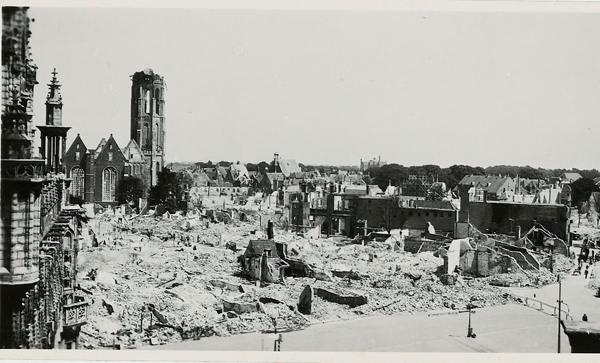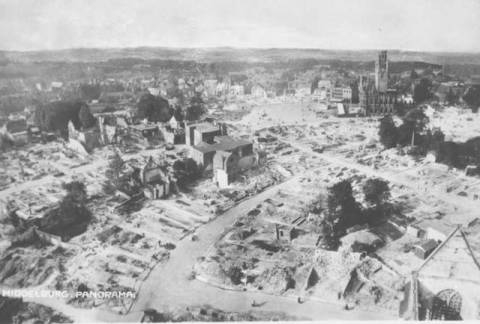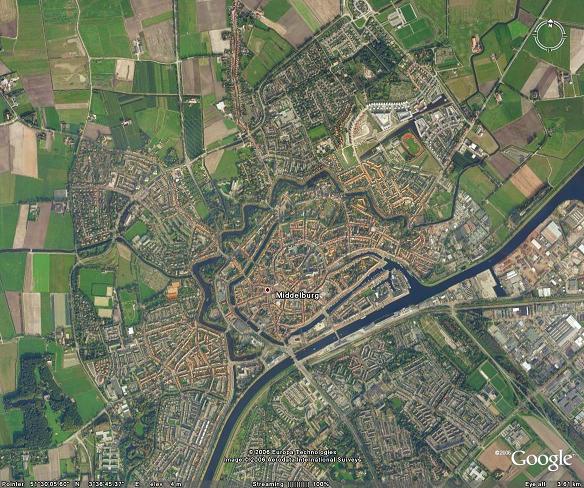
Market square after the bombardment.
If the bombardment of Rotterdam, together with that of Warsaw is one of the biggest atrocities of the early Second World War, it was not the only one. Three days after the bombardment forced the capitulation of the Netherlands, another Dutch town was bombed to the ground: my hometown, Middelburg.
Unlike Rotterdam, Middelburg has been somewhat forgotten outside Zeeland, only a footnote to the history of the German invasion in the “frightening May days of 1940”. But since this is the seventieth anniversary of the bombardment, some care has been put into making sure it won’t pass by unnoticed again. An academic research and lecture programme has been set up, as well as a series of more conventional remembrances, an educational package has been prepared for the province’s secondary and primary schools, all of which is of course coordinated with a frankly not very good website. A bit of a waste opportunity that site, only available in Dutch, with the history of the bombardment, the most important part, hidden away in PDF files. On the plus side, it has some good pictures of the devastation caused by the bombardment, the picture above being one of them.

What Middelburg looked liked after the bombardment.
On 10 May 1940 the Germans invaded the Netherlands and Belgium on their way to France. As they had tried more or less the same thing in the First World War the French strategy was to meet them halfway, moving into Belgium and the Southern Netherlands to stop them. As you know this wasn’t quite succesful, but some French units (including French Moroccan units) managed to get as far as Breda before retreating westwards into Zeeland. This was the reason why the Dutch surrender on the fifteenth did not include Zeeland, as that was occupied by French troops. The slow withdrawal of the French meant that on the 17th Middelburg was near the frontline, with most inhabitants fortunately evacuated already as a precaution. That day a combination of aerial and artillery bombardment by the Germans broke the last resistance in Zeeland, with the last French soldiers already having disappeared into Belgium.
Twentytwo people died in the bombardment, which could have been much higher had there been no evacuation. The material devastation however was enormous, with most of the historical centre — some parts dating back to around 800 CE — destroyed. Some 253 houses and 320 shops and other business buildings were destroyed, as well as another 18 or so public buildings, including the old abbey and the city hall. The evacuation may have saved lifes, but it also meant there were few people other than the voluntary fire fighters available to extinguish the many small fires that the bombardment started; much of the damage therefore was done by fire rather than explosion. That it was such nice, warm, dry spring weather didn’t help either…
Unlike Rotterdam the bombardment was not intended as a terror bombardment, but a tactical decision to break the remaining resistance in Zeeland. The Germans supposed that Middelburg was were the French units had their headquarters and allegedly also believe there were artillery and anti-aircraft guns in place in the city, which was not the case. These reasons for the bombardment do not excuse the crime of course, but do make the bombardment more understandable than that of Rotterdam.
After the war the rebuild of Middelburg had to start. Where in Rotterdam the city had chosen to be brutally unsentimental in rebuilding its city centre, chosing for a throroughly modern approach, Middelburg chosen to try and recreate the old centre, though it did take advantage of the opportunity to rationalise the centre somewhat. The large open market in the heart of the city was split in two by creating a new row of houses through the middle of it, several smaller streets completely disappeared, while a few other changes meant the rebuild city hall and abbey were more visible, no longer hidden behind cramped streets. It worked out well in the end, though the price was high.

Jay Vos
May 17, 2010 at 12:44 pmI didn’t know Middleburg was your hometown. My dad was from Zeeland; my grandfather was meester of the school in Arnemuiden and Nieuwdorp and my uncle was the doctor in Wolphaartsdijk.
I don’t know if you saw this video, appeared today on YouTube channel for GeschidenisTV
http://www.youtube.com/watch?v=njriNsdzpEA
palau
May 18, 2010 at 11:44 amSo accurate is it’s restoration, that despite having visited numerous times, until you told me I never even realised Middelburg had been bombed,
My own historic home town was blitzed absolutely flat and rebuilt on the Rotterdam model of concrete modernism.
What a waste of an opportunity.
Martin Wisse
May 18, 2010 at 3:45 pmThanks Jay, Palau, for the links. Nice video, great picture stream of Plymouth.
Yeah, you never know it until it’s pointed out or unless you carefully compare prewar pictures of Middelburg with the postwar situation.